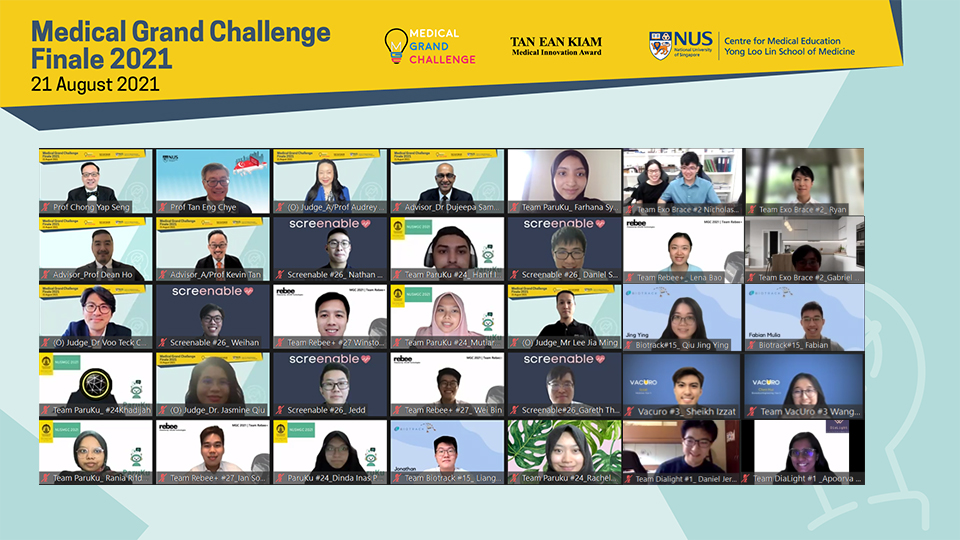Medical Grand Challenge 2021 Finale
Published: 21 Aug 2021

For the first time since inception, international teams compete with local students to solve healthcare dilemmas in the fifth edition of the NUS Medical Grand Challenge (MGC) which took place online on 21 August 2021.
The innovative solutions of 16 teams were assessed by a panel of judges representing a variety of industries such as information technology, healthcare and engineering. Each team brought their proposal to life and had their ideas judged for impact on healthcare, innovation, business strategy, marketing and commercialisation.
Team Rebee+ — a team that developed a new lower-back pain physiotherapy programme, which utilises a novel wearable sensor and application technology for remote monitoring in patients recovering from musculoskeletal issues requiring physiotherapy — swept up the top prize in the Open Category. Team Exo-brace brought back top honours in the Nascent Category with a brace that provides knee osteoarthritis patients the stability and mechanical advantage they need to ambulate early after their total knee replacement surgery.
Runner up in the Open Category, BioTrack, came up with a wearable 12-Lead ECG monitor that automatically takes measurements and send them to a cloud server with Artificial Intelligence (AI) assisted diagnostic algorithms for doctors for review if any undesirable conditions are identified by the AI. Runner up in the Nascent Category was Project Dialight who worked on easy-to-use solution that would empower the patients to treat their diabetic foot ulcers at home. The goal of the project is to prevent infection, the progression of infection to later stages and to promote wound healing.
Team ParuKu devised a chatbot application aimed at the preliminary detection of respiratory diseases, winning the hearts of the audience and clinching the People’s Choice award. Taking third place in the Open Category and winning the Social Responsibility award was Team Screenable, who worked with tech mentor Dr Andrew Wu of Mesh Bio, to improve the DARA® — a predictive analytics and clinical workflow automation solution that automatically structures health data streams and synthesises actionable insights for doctors and patients.
Dr Tan See Leng, Minister for Manpower and an alumnus of NUS Medicine graced the event as Guest-of-Honour. In his speech, Dr Tan said, “The diversity of participants across countries and professional expertise epitomises the spirit of the Medical Grand Challenge to promote cultural diversity, inclusion, equity, and interdisciplinary collaboration. Not only will this accelerate our efforts to identify systemic and care gaps, but it will also allow us to co-create transformative and sustainable solutions using real world evidence.”
“The MGC is more than a competition for students to assess each other’s strengths and talents, or to beef up their portfolios. The multi-disciplinary nature of this challenge nudges our students to consider solutions from various dimensions and perspectives, and view problems they identify in a much larger context, instead of seeing global problems in conventional silos. We hope to nurture curious leaders who will be able to navigate the complexities and ambiguities of an ever-shifting global environment,” said Professor Chong Yap Seng, Dean of NUS Medicine.
Read more in the press release here.

